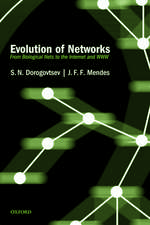Cybernetical Physics: From Control of Chaos to Quantum Control: Understanding Complex Systems
Autor A. Fradkoven Limba Engleză Paperback – 22 noi 2010
| Toate formatele și edițiile | Preț | Express |
|---|---|---|
| Paperback (1) | 638.43 lei 6-8 săpt. | |
| Springer Berlin, Heidelberg – 22 noi 2010 | 638.43 lei 6-8 săpt. | |
| Hardback (1) | 644.30 lei 6-8 săpt. | |
| Springer Berlin, Heidelberg – 4 ian 2007 | 644.30 lei 6-8 săpt. |
Din seria Understanding Complex Systems
- 18%
 Preț: 1112.30 lei
Preț: 1112.30 lei -
 Preț: 439.25 lei
Preț: 439.25 lei - 18%
 Preț: 1119.38 lei
Preț: 1119.38 lei - 15%
 Preț: 401.82 lei
Preț: 401.82 lei - 18%
 Preț: 1247.26 lei
Preț: 1247.26 lei - 15%
 Preț: 641.20 lei
Preț: 641.20 lei - 15%
 Preț: 642.68 lei
Preț: 642.68 lei - 15%
 Preț: 651.51 lei
Preț: 651.51 lei - 18%
 Preț: 946.55 lei
Preț: 946.55 lei - 18%
 Preț: 947.98 lei
Preț: 947.98 lei - 20%
 Preț: 650.27 lei
Preț: 650.27 lei - 18%
 Preț: 952.09 lei
Preț: 952.09 lei - 18%
 Preț: 957.13 lei
Preț: 957.13 lei - 18%
 Preț: 943.88 lei
Preț: 943.88 lei -
 Preț: 398.35 lei
Preț: 398.35 lei - 5%
 Preț: 1417.54 lei
Preț: 1417.54 lei - 15%
 Preț: 648.42 lei
Preț: 648.42 lei -
 Preț: 387.75 lei
Preț: 387.75 lei - 18%
 Preț: 1133.76 lei
Preț: 1133.76 lei - 18%
 Preț: 948.16 lei
Preț: 948.16 lei - 20%
 Preț: 655.85 lei
Preț: 655.85 lei - 18%
 Preț: 1113.09 lei
Preț: 1113.09 lei - 20%
 Preț: 655.53 lei
Preț: 655.53 lei - 15%
 Preț: 653.00 lei
Preț: 653.00 lei - 18%
 Preț: 1332.92 lei
Preț: 1332.92 lei - 18%
 Preț: 1010.48 lei
Preț: 1010.48 lei - 18%
 Preț: 955.56 lei
Preț: 955.56 lei -
 Preț: 384.22 lei
Preț: 384.22 lei - 18%
 Preț: 950.66 lei
Preț: 950.66 lei - 15%
 Preț: 644.49 lei
Preț: 644.49 lei - 15%
 Preț: 647.40 lei
Preț: 647.40 lei - 15%
 Preț: 649.06 lei
Preț: 649.06 lei - 15%
 Preț: 639.25 lei
Preț: 639.25 lei - 15%
 Preț: 643.65 lei
Preț: 643.65 lei - 18%
 Preț: 960.78 lei
Preț: 960.78 lei - 15%
 Preț: 649.87 lei
Preț: 649.87 lei - 15%
 Preț: 645.47 lei
Preț: 645.47 lei
Preț: 638.43 lei
Preț vechi: 751.10 lei
-15% Nou
Puncte Express: 958
Preț estimativ în valută:
122.16€ • 127.56$ • 100.88£
122.16€ • 127.56$ • 100.88£
Carte tipărită la comandă
Livrare economică 15-29 aprilie
Preluare comenzi: 021 569.72.76
Specificații
ISBN-13: 9783642079672
ISBN-10: 3642079679
Pagini: 256
Ilustrații: XII, 236 p.
Dimensiuni: 155 x 235 x 13 mm
Greutate: 0.36 kg
Ediția:Softcover reprint of hardcover 1st ed. 2007
Editura: Springer Berlin, Heidelberg
Colecția Springer
Seria Understanding Complex Systems
Locul publicării:Berlin, Heidelberg, Germany
ISBN-10: 3642079679
Pagini: 256
Ilustrații: XII, 236 p.
Dimensiuni: 155 x 235 x 13 mm
Greutate: 0.36 kg
Ediția:Softcover reprint of hardcover 1st ed. 2007
Editura: Springer Berlin, Heidelberg
Colecția Springer
Seria Understanding Complex Systems
Locul publicării:Berlin, Heidelberg, Germany
Public țintă
ResearchCuprins
Introduction: Physics and Cybernetics.- Subject and Methodology of Cybernetical Physics.- Control of Conservative Systems.- Control of Dissipative Systems.- Controlled Synchronization.- Control of Chaos.- Control of Interconnected and Distributed Systems.- Control of Molecular and Quantum Systems.- Control Algorithms and Dynamics of Physical Systems.- Examples.- Conclusions: Looking into the Future.
Recenzii
From the reviews:
"This book belongs to a interdisciplinary area which is infinitely broad and reflects the increase of information exchange and dissemination of ideas between experts from different backgrounds and research areas. The contents of this book is really wide. … This book is a part of Springer complexity program and may be very useful for researchers from different backgrounds in physics, mathematics, engineering and postgraduate students working for a deeper understanding of structure and behavior of complex systems." (Yuri N. Sankin, Zentralblatt MATH, Vol. 1117 (19), 2007)
"This book is an attempt to present a unified exposition of the subject and methodology of cybernetical physics as well as solutions to some of its problems. … has been written for researchers with diverse backgrounds in physics, mathematics, and engineering, and this makes it suitable for graduate students as an introduction to a broad range of complex systems in the natural sciences. The book has eleven chapters and seventy figures." (Vimal Singh, Mathematical Reviews, Issue 2008 j)
"This book belongs to a interdisciplinary area which is infinitely broad and reflects the increase of information exchange and dissemination of ideas between experts from different backgrounds and research areas. The contents of this book is really wide. … This book is a part of Springer complexity program and may be very useful for researchers from different backgrounds in physics, mathematics, engineering and postgraduate students working for a deeper understanding of structure and behavior of complex systems." (Yuri N. Sankin, Zentralblatt MATH, Vol. 1117 (19), 2007)
"This book is an attempt to present a unified exposition of the subject and methodology of cybernetical physics as well as solutions to some of its problems. … has been written for researchers with diverse backgrounds in physics, mathematics, and engineering, and this makes it suitable for graduate students as an introduction to a broad range of complex systems in the natural sciences. The book has eleven chapters and seventy figures." (Vimal Singh, Mathematical Reviews, Issue 2008 j)
Textul de pe ultima copertă
The control of complex systems is one of the most important aspects in dealing with systems exhibiting nonlinear behaviour or similar features that defy traditional control techniques. This specific subject is gradually becoming known as cybernetical physics, borrowing methods from both theoretical physics and control engineering.
This book is, perhaps, the first attempt to present a unified exposition of the subject and methodology of cybernetical physics as well as solutions to some of its problems. Emphasis of the book is on the examination of fundamental limits on energy transformation by means of control procedures in both conservative and dissipative systems. A survey of application in physics includes the control of chaos, synchronisation of coupled oscillators, pendulum chains, reactions in physical chemistry and of quantum systems such as the dissociation of diatomic molecules.
This book has been written having researchers from various backgrounds in physics, mathematics and engineering in mind and is thus also suitable as introduction to graduate students working on the understanding of a broad range of complex systems in the natural sciences.
This book is, perhaps, the first attempt to present a unified exposition of the subject and methodology of cybernetical physics as well as solutions to some of its problems. Emphasis of the book is on the examination of fundamental limits on energy transformation by means of control procedures in both conservative and dissipative systems. A survey of application in physics includes the control of chaos, synchronisation of coupled oscillators, pendulum chains, reactions in physical chemistry and of quantum systems such as the dissociation of diatomic molecules.
This book has been written having researchers from various backgrounds in physics, mathematics and engineering in mind and is thus also suitable as introduction to graduate students working on the understanding of a broad range of complex systems in the natural sciences.














